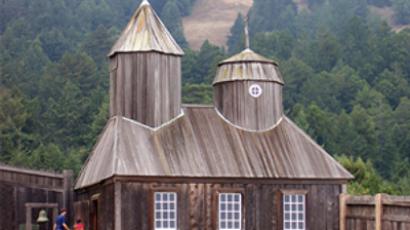Medvedev logs into Silicon Valley
On his first trip to California, Russian President and aficionado of hi-tech products Dmitry Medvedev was promoting Russia as a country whose priority is innovation.
Earlier on Wednesday, Dmitry Medvedev touched down in San Francisco where he met with Californian Governor Arnold Schwarzenegger and former US Secretary of State George Shultz.
Recalling the time he spent in Moscow filming “Red Heat”, Schwarzenegger stressed that Medvedev is a special guest for him and the State of California.
“We know you are very interested not only in developing and diversifying the economy, but also you are very interested in nuclear disarmament,” the AFP quotes Schwarzenegger’s words to Medvedev.
The two attended the signing of a memorandum on cooperation between Russia’s Renova corporation and the State of California in preparing for the 200th anniversary celebration of Fort Ross State Historic Park in 2012.
Renova head Viktor Vekselberg declared that his company will pay more than $1 million a year to keep Fort Ross up and running.
“You probably know that the fort itself is not big, however there are a number of important programmes regarding it which demand investment,” Vekselberg said.
Dmitry Medvedev visited Silicon Valley, a major center of innovation, to invite interest and participation in Russia's future hi-tech centre of its own: Skolkovo.
Skolkovo is a recent major project with the aim of expanding Russia's innovative capabilities.
“It may be an extraordinary decision, but there will be a special, preferential tax regime, special procedures of registration and control, and even special legislative procedures. If all this is implemented, I am sure of the project’s success,” said Dmitry Medvedev.
Russian President met with technology leaders from four top IT companies: Twitter, Cisco, Apple and Google, as well as the Valley’s office of Russia’s Yandex Lab.
With major stress on innovation throughout the day, Dmitry Medvedev played the role model of Russia’s sincere commitment to modern technologies.
As a result of his trip, Medvedev became one of the first lucky owners of the much-coveted iPhone 4G from Apple, which has not yet even hit the shelves.
Russian president, who already has his blog, created his personal Twitter account and tweeted his first message.
“I would like to see how everything functions there. It will not be a guided tour. I would like to establish fully-fledged relations and cooperation with those companies as a result of this trip,” he said.
Aleksey Andreev, the editor-in-chief of Webplanet.Ru – a news website focusing on internet technologies – noted that Russia boasts massive intellectual resources.
“Russia can help the US in terms of technologists, because it still has a pretty good mathematical school and technological school,” Andreev told RT. “And after the fall of the Soviet Union, most Russian specialists lost their jobs, some went abroad, others turned to criminal activities. Everyone knows that the best viruses are written in Russia.”
Moreover, Andrey Podshibyakin, a specialist in social media marketing and blogger, told RT that unlike in other countries, Russia’s web market is dominated by national products.
“Russia is one of the few regions where local Internet services are competitive to global Internet services,” Podshibyakin said. “For instance, our search engine Yandex is bigger than Google, and our social network VKontakte is much bigger than Facebook. And it is without any government protection.”
Meanwhile, editorial director at the Moscow-based Zhelezo computer magazine Andrey Mikhailyuk sees great promise in the Skolkovo project.
“Russia is near China, which is ‘the factory of everything’. If your development is near the factory, you are the winner,” Mikhailyuk told RT.
Though all the major political talk is to be done on Thursday in Washington DC, Dmitry Medvedev did touch upon some political issues of Russia’s domestic and foreign politics when speaking in a packed hall at Stanford University.
He claimed that Russia will always be a predictable international partner with a transparent and clear foreign policy.
“Russia is a young democracy. We certainly are not free from making mistakes and we are ready to improve our political system, but we will do this on our own, without being instructed from outside,” Medvedev said. “Only a political system which is open to change can be stable.”
Something which was also of big interest to the audience at Stanford was whether or not Medvedev is planning to stick around for a second term as Russia’s president, and he did give a little hint.
“Should the plans I have formulated here start being implemented and with support from the people – which is most important for any politician to be successful and have something to count on, including a second term – should I have the wish to do this, I do not rule this out,” he said.
Another question was directed at the future of ties between Russia and Georgia.
“Our relations with Georgia are dramatically bad and it is not our fault, because we believe Russia protected its citizens and its interests – unfortunately this led to very sad consequences,” Medvedev stated. “However, I would love to have our relations with Georgia return to normal. What’s more, I’m absolutely sure this will be so.”
“I don’t see any chances to do that with the current president of Georgia, because I do believe he did a bad thing and in legal terms he committed a crime,” he added. “His responsibility should be before the Georgian people and not the Russian people. As soon as Georgia gets a new leader, we will have every opportunity to restore our relations.”
President Medvedev then headed for Washington DC, where he will later meet with US President Barack Obama.
The summit has been dubbed by the Obama administration as “the summit of innovation”. Apart from trade and finance, some political matters are also high on the agenda. Thus, the presidents are likely to discuss Iran given the fact that the recent US decision to unilaterally impose harsher sanctions on the country came under severe criticism from Russia. Another issue in focus is the ratification of the recently signed START treaty.
Andrey Sushentsov from the Moscow State University of International Relations believes that Medvedev’s visit to the US is very symbolic.
“This is the first time in history when Russia’s president went to the US with economic purposes only. We cannot remember when security was not on the agenda of the visit. I believe this trip is symbolically similar to the trip of Chinese leadership to the US in the early 1980s. That period in the US–China relationship was the beginning of the world’s biggest bilateral trade and investments,” Sushentsov told RT.














